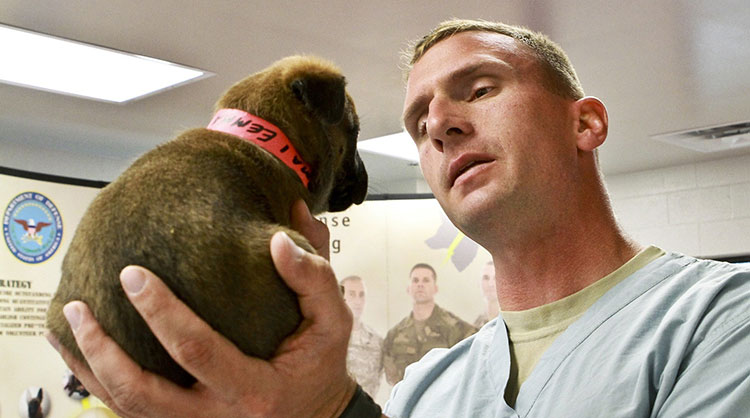Why Dog Vaccinations Are Crucial to Keep Your Pooch Healthy
Dogs, just like humans, require disease protection to ensure that they live long, happy and healthy lives. This is why it’s so important to keep their dog vaccinations up to date. Read on to learn more about maintaining good dog health throughout your four-legged friend’s life.
DOG HEALTH

Posted by bravectosouthafrica – 03 December 2019
Ensuring Your Dog is Happy and Healthy, No Matter What Their Age
The moment you decide to bring a new dog home, you commit to a rewarding and lifelong journey of mutual companionship. Adopting a dog is a big undertaking, as their continued health and wellbeing is quite literally in your hands.
For your dog to truly thrive, they’ll need access to more than just food, water and attention. Regular visits to the vet and keeping them up to date on their dog vaccinations are a must.
Just like humans, failing to vaccinate can leave your dog vulnerable to various dangerous – but preventable – diseases. It is important to note that dog vaccinations are safe, tried and tested. The benefits of vaccinating your pup far outweigh any risks.
In short, ensuring your dog is around for many happy and healthy years is possible by providing them with:
- Good nutrition and a balanced diet – A dog’s diet should be customised to suit their level of activity, breed and size. Your vet will be able to assist you in determining what is right for your dog.
- Enough exercise – Mix things up when it comes to your dog’s exercise regimen to keep them in good shape and stimulated.
- Oral hygiene – Speak to your vet about the best ways to keep your dog’s gums and teeth in tip-top shape.
- Grooming – Tend to your dog’s hair, nails and skin regularly to ensure everything is looking good. Alternatively, have your pooch visit a professional dog groomer at regular intervals.
- Routine vet visits – There’s no care quite like preventative care. By taking your dog to the vet frequently, you’ll be able to identify and deal with any developing issues early on. A visit to your vet at least once a year is recommended.

Pure Bred or Mixed: Specific Dog Breed Health Problems
Deciding on what kind of dog you want to bring into your household is part of your big decision and should be taken seriously. Do your research before committing to a specific breed, as particular pedigree pups are more prone to suffer from breed-related health issues.
Despite this being the case, providing any dog with preventative care – i.e. quality diet, enough exercise, parasite control, regular vet check-ups and keeping up to date with their dog vaccinations – will help them live their best and fullest life possible. Remember: early intervention will always lead to the best possible prognosis.
Be sure to have your new dog visit the vet soon after adopting or buying them, so that you can start your life together off right.

Keeping Up to Date on Dog Vaccinations
Your vet will recommend the best course of action for treating your dog’s ear mites. Bravecto®, either the Chew or the Spot-On for Dogs, are popular and effective choices against various external parasites, including ticks, fleas and mites.
Stronger topical treatments are also available, which will need to be used for around 10-14 days. Thankfully, topical treatments can kill mites in all stages of their lifecycle. These treatments also include medication that will treat any underlying infections caused by the mites.
Ask your vet about using Bravecto® in the treatment of ear mites in your dog. Not only is it tried and tested, but it also boasts long-lasting effects.
Are There Oral Medications Available for Treating Ear Mites in Dogs?
Dog vaccines can come in two forms: a few drops in the nose or a small injection underneath the skin. The importance of sticking to the recommended vaccination schedule cannot be stressed enough, as keeping your dog’s immune system strong will help them to successfully combat a variety of preventable diseases.
The vaccines required will largely vary from dog to dog, depending on factors such as the area in which they live, as well as their lifestyle. Your vet will be able to identify what vaccines your dog needs to remain healthy.
Common canine diseases that are vaccinated against include:
- Canine distemper – essential
- Canine parvovirus – essential
- Infectious hepatitis – essential
- Rabies – essential
- Canine coronavirus – optional
- Kennel cough – optional
- Leptospirosis – optional
Be sure to keep a thorough record of your dog’s vaccinations, so that they can receive their booster shots on time. A record of their vaccination history may not only be necessary when visiting the vet, but also when planning on air travelling. Ask your vet for a vaccination booklet – it’s perfect for keeping track of each vaccination, as well as other essentials like deworming.

The Risk of Unvaccinated Dogs
Dogs are explorers by heart. They love nothing more than to fully experience life and this usually involves sniffing and licking new things that catch their attention when out and about. Your dog may encounter other animals during their adventures – be it during a walk or even in your backyard. All this sniffing, licking and coming into contact with strange animals and objects could potentially lead to your dog contracting a disease. Dog vaccinations will help your dog’s immune system remain strong and active against these threats.
One of the deadliest diseases commonly contracted by puppies is parvovirus. Luckily, effective and safe vaccines are available to help keep your furry little one healthy.
Be sure to check out Bravecto®’s video on dog vaccinations here.
What Is Canine Parvovirus?
Canine parvovirus is an extremely infectious disease that attacks the lining of a dog’s digestive tract. This virus is transmitted through the faeces of infected dogs and can survive for longer than a year in the environment. It isn’t easily inactivated, making it hard to determine whether or not your dog has been exposed.
Parvovirus particles, called fomites, can even be transmitted onto your clothing if you happen to come into contact with an infected dog. These particles can then be transferred to your own pooches when you return home and lovingly greet them.
Once contracted, parvovirus can act swiftly. This is why it’s so important to provide your dog with vaccination protection. If you notice something off about your pup, don’t hesitate to discuss it with your vet.
Symptoms of canine parvovirus include:
- Vomiting
- Decreased appetite
- Rapid or sudden onset lethargy
- Watery, sometimes bloody, diarrhoea
External Parasite Protection – No Vaccinations Necessary
Even dogs who are fully vaccinated still require frequent anti-parasite treatments to remain in tip-top condition. Certain parasites can be transmitted from mother to puppy even before birth, which is why it’s so important to deworm pregnant dogs as well.
Be sure to deworm your new puppy as a precautionary measure. Your vet will be able to advise you on the best deworming product for your pup, as age and weight will play a role.
External parasite protection, on the other hand, couldn’t be easier. All your pet needs is four doses of Bravecto® a year! This long-lasting and fast-acting solution protects your furry friends from external parasites such as ticks, fleas and mites. Bravecto® is available in both a topical and a chew form for dogs. Administering either treatment is pain-free and easy.
Bravecto® Spot-On for Dogs is applied by parting the hair between the shoulder blades and dabbing the product onto the exposed skin, while Bravecto® Chew is given orally, like a treat, with food.
Not only does Bravecto® last at least 3x longer than monthly tick, flea and mite treatments, but it’s also safe to use in all dogs, with no ill side effects. This includes breeding, pregnant and lactating dogs, as well as dogs with the MDR 1 gene deficiency.
As long as your pup weighs at least 2 kg and is 8 weeks or older, they can start experiencing the Bravecto® difference.

Adult Dog Health Concerns
Older dogs can suffer from a broad range of health problems. Some of the most common issues include:
- Gum and teeth issues
- Ear issues
- Skin health issues – including allergies
- Stomach issues – i.e. stomach upset
- Diabetes
- Cancer
- Arthritis
If you are concerned about your dog’s health and feel that something isn’t quite right or they aren’t acting like their normal self, take your pup to the vet ASAP. Always rather be safe than sorry!

Subscribe to our Newsletter
Get to know your furry friend better! Sign up for all things dog- or cat-related.
The Hairy Facts about the dreaded hairball
12 April 2021
Help! My dog’s barking mad! Volume 2
12 April 2021
Your Itchy, Scratchy Cat – All About Cat Skin Problems
12 April 2021
The Dog’s Diet: A Bone of contention?
01 April 2021
Mango Fly Worms: How to Spot and Eliminate them
Posted on November 28,2019
Managing Mange And Mites In Your Dog
Posted on June 11,2018
Why Do Cats Purr and How? Learn What Your Cat Is Saying
Posted on October 14,2020
How to Get Rid of Ear Mites in Dogs
Posted on November 06,2019









